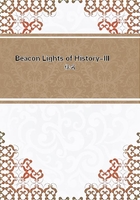
第154章
Then Luther rose, more powerful, more eloquent more majestic than before; he rose superior to himself. "What," said he, "keep the light of life from the people; take away their guide to heaven;keep them in ignorance of what is most precious and most exalting;deprive them of the blessed consolations which sustain the soul in trial and in death; deny the most palpable truths, because your dignitaries put on them a construction to bolster up their power!
What an abomination! what treachery to heaven! what peril to the souls of men! Besides, your authorities differ. Augustine takes different ground from Pelagius; Bernard from Abelard; Thomas Aquinas from Dun Scotus. Have not your grand councils given contradictory decisions? Whom shall we believe? Yea, the popes themselves, your infallible guides,--have they not at different times rendered different decisions? What would Gregory I. say to the verdicts of Gregory VII.?
"No, the Scriptures are the legacy of the early Church to universal humanity; they are the equal and treasured inheritance of all nations and tribes and kindreds upon the face of the earth, and will be till the day of judgment. It was intended that they should be diffused, and that every one should read them, and interpret them each for himself; for he has a soul to save, and he dare not intrust such a precious thing as his soul into the keeping of selfish and ambitious priests. Take away the Bible from a peasant, or a woman, or any layman, and cannot the priest, armed with the terrors and the frauds of the Middle Ages, shut up his soul in a gloomy dungeon, as noisome and funereal as your Mediaeval crypts?
And will you, ye boasted intellectual guides of the people, extinguish reason in this world in reference to the most momentous interests? What other guide has a man but his reason? And you would prevent this very reason from being enlightened by the Gospel! You would obscure reason itself by your traditions, O ye blind leaders of the blind! O ye legal and technical men, obscuring the light of truth! O ye miserable Pharisees, ye bigots, ye selfish priests, tenacious of your power, your inventions, your traditions,--will ye withhold the free redemption, God's greatest boon, salvation by the blood of Christ, offered to all the world?
Yea, will you suffer the people to perish, soul and body, because you fear that, instructed by God himself, they will rebel against your accursed despotism? Have you considered what a mighty crime you thus commit against God, against man? Ye rule by an infernal appeal to the superstitious fears of men; but how shall ye yourselves, for such crimes, escape the damnation of that hell into which you would push your victims unless they obey YOU?
"No, I say, let the Scriptures be put into the hands of everybody;let every one interpret them for himself, according to the light he has; let there be private judgment; let spiritual liberty be revived, as in Apostolic days. Then only will the people be emancipated from the Middle Ages, and arise in their power and majesty, and obey the voice of enlightened conscience, and be true to their convictions, and practise the virtues which Christianity commands, and obey God rather than man, and defy all sorts of persecution and martyrdom, having a serene faith in those blessed promises which the Gospel unfolds. Then will the people become great, after the conflicts of generations, and put under their feet the mockeries and lies and despotisms which grind them to despair."Thus was born the third great idea of the Reformation, out of Luther's brain, a logical sequence from the first idea,--the right of private judgment, religious liberty, call it what you will; a great inspiration which in after times was destined to march triumphantly over battle-fields, and give dignity and power to the people, and lead to the reception of great truths obscured by priests for one thousand years; the motive of an irresistible popular progress, planting England with Puritans, and Scotland with heroes, and France with martyrs, and North America with colonists;yea, kindling a fervid religions life; creating such men as Knox and Latimer and Taylor and Baxter and Howe, who owed their greatness to the study of the Scriptures,--at last put into every hand, and scattered far and wide, even to India and China. Can anybody doubt the marvellous progress of Protestant nations in consequence of the translation and circulation of the Scriptures?
How these are bound up with their national life, and all their social habits, and all their religious aspirations; how they have elevated the people, ten hundred millions of times more than the boasted Renaissance which sprang from apostate and infidel and Pagan Italy, when she dug up the buried statues of Greece and Rome, and revived the literature and arts which soften, but do not save--for private judgment and religious liberty mean nothing more and nothing less than the unrestricted perusal of the Scriptures as the guide of life.
This right of private judgment, on which Luther was among the first to insist, and of which certainly he was the first great champion in Europe, was in that age a very bold idea, as well as original.